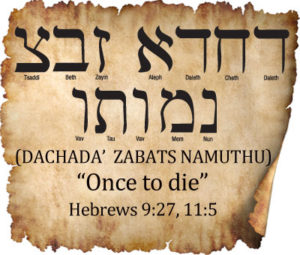ARAMAIC WORD STUDY – ONCE TO DIE – DACHADA’ ZABATS NAMUTHU דחדא זבצ נמותו
Hebrews 9:27: “And as it is appointed unto men once to die, but after this the judgment:”
Hebrews 11:5: “By faith Enoch was translated that he should not see death.”
 If it is appointed unto man once to die, then what about Enoch who never died? Is Paul contradicting himself? Hebrews 9:27 in the Aramaic presents something very curious. In the Greek is says that it is appointed unto man once to die. But in the Aramaic, Paul’s native language, it reads as: “It is established unto man at one time he will be (spiritually) dead (spiritually condemned) then out of that condemnation they will be judge when they (physically) die.
If it is appointed unto man once to die, then what about Enoch who never died? Is Paul contradicting himself? Hebrews 9:27 in the Aramaic presents something very curious. In the Greek is says that it is appointed unto man once to die. But in the Aramaic, Paul’s native language, it reads as: “It is established unto man at one time he will be (spiritually) dead (spiritually condemned) then out of that condemnation they will be judge when they (physically) die.
The word appoint in Aramaic is sum which means to establish You see the first time the word for death is prefixed with a Nun which in the Hebrew would put it in a Niphal form only the Aramaic does not have a Niphal form. Checking the Grammar book by William Stevenson it appears that this could put that word into a Ithpeel which would be similar to the Hithpael. This makes it reflexive. Thus this first death is one that we bring on ourselves. But does not God have control over life and death? The word death here is muth which can be both spiritual and physical death.
There are two deaths, spiritual and physical. Paul teaches just a few chapters back: Hebrews 2:3 “How shall we escape if we neglect so great salvation.” Enoch was a sinner who found the great salvation and thus he did not die spiritually and according to the Aramaic rendering, even though he did not physically there would be no contradiction. I do respect those with opposing views, but they are entitled to their view as I am entitled to mine. As an old Jewish lady once said to me: “You believe your way, I believe my way, everybody happy.”







While meditating on this I realized a simple truth. When my mother and father died their human bodies stopped working. They stopped breathing, their hearts stop pumping and all the internal organs stopped functioning. At that point the separation of their spirit from their body took place. But in those who experience their spirit leaving them while their bodies are still alive (Enoch, Elijah and Moses?) well must be a glorious experience that divine kiss you speak about. I hope I’m one of the later!
ENOCH & ELIJAH – It is possible that someday in the future these two men will experience physical death. The Book of Revelation speaks of two witnesses who will appear shortly before the coming of Christ.
I enjoy your work and have several of your books. You have given me a deeper appreciation for the work of translators and their struggle to convey the original meaning of the Word. I am in awe of your knowledge of ancient languages, customs, and histories of the people of the Bible.
Thank you for all that you do.
elmo
I really can’t say who the two witnesses are, that is something that will remain a mystery until the time comes. However, consider, what is death? The word moth in Hebrew, the word for death, can mean both physical and spiritual. It just has the idea of a separation. In our context a separation from the body and the spirit. Maybe Enoch and Elijah experience a separation from the physical bodies to some spiritual form that is not subject to deterioration, heart attacks, strokes or aging. They may have experienced some transformation as one will do in the rapture. The Bible only records two individuals who did not experience death, who is to say there are not more throughout history and even today? I suspect one day when we are in heaven we will wonder what all the fuss was about regarding death. I never mourned my parents passing because I had that deep inner confidence that I would see them again in a few short years in a state without their physical problems.
If God is ” not a respecter of persons” and it is appointed for (every) man once to die, Hebrews 9 tells us that Christ died once for all. So he, having been offered up once in order that HU NASA CHET RABBIM (“he bore away the sin of many”. In order for God’s Word to carry no exceptions [Enoch / Elijah] we must consider we are “born dead” due to original sin, the death Jesus came to release all men from. Joh 5:24 Most assuredly, I say to you, he who hears My word and believes in Him who sent Me has everlasting life, and shall not come into judgment, but has passed from death into life. Those who do not believe on him continue on to the second death and judgment. B